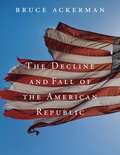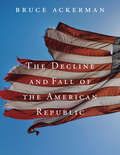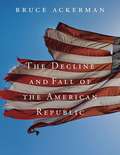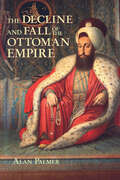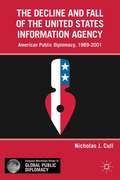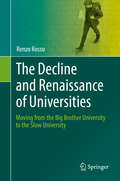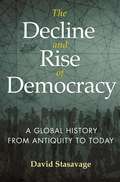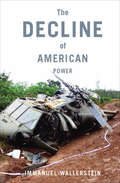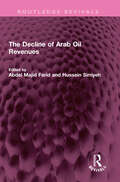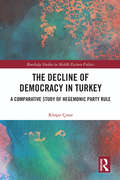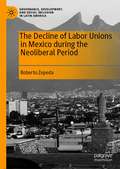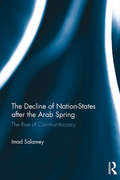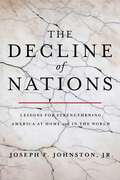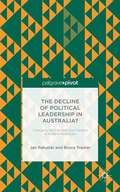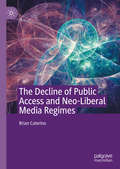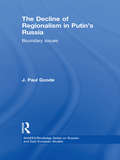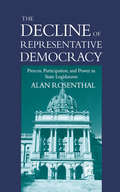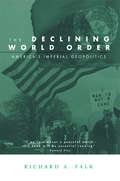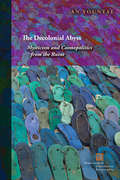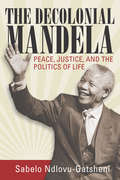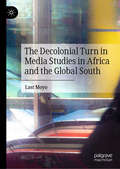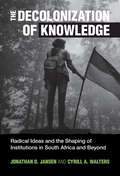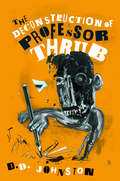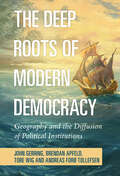- Table View
- List View
The Decline and Fall of the American Republic (Tanner lectures on human values #6)
by Bruce AckermanConstitutional thought is currently dominated by heroic tales of the Founding Fathers — who built an Enlightenment machine that can tick-tock its way into the twenty-first century, with a little fine-tuning by the Supreme Court. However, according to Bruce Ackerman, the modern presidency is far more dangerous today than it was when Arthur Schlesinger published the Imperial Presidency in 1973. In this book, he explores how the interaction of changes in the party system, mass communications, the bureaucracy, and the military have made the modern presidency too powerful and a threat to liberal constitutionalism and democracy. Ackerman argues that the principles of constitutional legitimacy have been undermined by both political and legal factors. On the political level, by “government by emergency” and “government by public-opinion poll”; on the legal, by two rising institutions: The Office of Legal Counsel in the Department of Justice and the Office of the Presidential Counsel in the White House. Both institutions came out of the New Deal, but have gained prominence only in the last generation. Lastly, Ackerman kicks off a reform debate that aims to adapt the Founding ideal of checks-and-balances to twenty-first century realities. His aim is not to propose definitive solutions but to provoke a national debate on American democracy in its time of trouble.
The Decline and Fall of the American Republic (The Tanner Lectures #12)
by Bruce Ackerman“Audacious . . . offers a fierce critique of democracy’s most dangerous adversary: the abuse of democratic power by democratically elected chief executives.” (Benjamin R. Barber, New York Times bestselling author of Jihad vs. McWorld )Bruce Ackerman shows how the institutional dynamics of the last half-century have transformed the American presidency into a potential platform for political extremism and lawlessness. Watergate, Iran-Contra, and the War on Terror are only symptoms of deeper pathologies. Ackerman points to a series of developments that have previously been treated independently of one another?from the rise of presidential primaries, to the role of pollsters and media gurus, to the centralization of power in White House czars, to the politicization of the military, to the manipulation of constitutional doctrine to justify presidential power-grabs. He shows how these different transformations can interact to generate profound constitutional crises in the twenty-first century?and then proposes a series of reforms that will minimize, if not eliminate, the risks going forward. “The questions [Ackerman] raises regarding the threat of the American Executive to the republic are daunting. This fascinating book does an admirable job of laying them out.” —The Rumpus“Ackerman worries that the office of the presidency will continue to grow in political influence in the coming years, opening possibilities for abuse of power if not outright despotism.” —Boston Globe“A serious attention-getter.” —Joyce Appleby, author of The Relentless Revolution“Those who care about the future of our nation should pay careful heed to Ackerman’s warning, as well as to his prescriptions for avoiding a constitutional disaster.” —Geoffrey R. Stone, author of Perilous Times
The Decline and Fall of the American Republic (The Tanner Lectures on Human Values, Book #12)
by Bruce AckermanBruce Ackerman shows how the institutional dynamics of the last half-century have transformed the American presidency into a potential platform for political extremism and lawlessness. Watergate, Iran-Contra, and the War on Terror are only symptoms of deeper pathologies. Ackerman points to a series of developments that have previously been treated independently of one another--from the rise of presidential primaries, to the role of pollsters and media gurus, to the centralization of power in White House czars, to the politicization of the military, to the manipulation of constitutional doctrine to justify presidential power-grabs. He shows how these different transformations can interact to generate profound constitutional crises in the twenty-first century--and then proposes a series of reforms that will minimize, if not eliminate, the risks going forward. The book aims to begin a new constitutional debate. Americans should not suppose that Barack Obama's centrism and constitutionalism will typify the presidencies of the twenty-first century. We should seize the present opportunity to confront deeper institutional pathologies before it is too late.
The Decline and Fall of the Ottoman Empire
by Alan Palmer“A scholarly, readable and balanced history.” —The Independent on SundayLike England’s Charles II, the Ottoman Empire took “an unconscionable time dying.” Since the seventeenth century, observers had been predicting the collapse of this so-called Sick Man of Europe, yet it survived all its rivals. As late as 1910, the Ottoman Empire straddled three continents. Unlike the Romanovs, Habsburgs, or Hohenzollerns, the House of Osman, which had allied itself with the Kaiser, was still recognized as an imperial dynasty during the peace conference following World War I.This book offers a provocative view of the empire’s decline, from the failure to take Vienna in 1683 to the abolition of the Sultanate by Mustafa Kemal (Atatürk) in 1922 during a revolutionary upsurge in Turkish national pride. The narrative contains instances of violent revolt and bloody reprisals, such as the massacres of Armenians in 1896, and other “ethnic episodes” in Crete and Macedonia. More generally, it emphasizes recurring problems: competition between religious and secular authority; the acceptance or rejection of Western ideas; and the strength or weakness of successive Sultans. It also highlights the special challenges of the early twentieth century, when railways and oilfields gave new importance to Ottoman lands in the Middle East.Alan Palmer offers considerable insight into the historical roots of many contemporary problems in the Middle East and the Balkans as well as the Kurdish struggle for survival. He also recounts the Ottoman Empire’s lingering interests in their oil-rich Libyan provinces. By exploring that legacy over three centuries, The Decline and Fall of the Ottoman Empire examines a past whose effect on the present may go a long way toward explaining the future.“Alan Palmer writes the sort of history that dons did before ‘accessible’ became an academic insult. It is cool, rational, scholarly, literate.” —John Keegan
The Decline and Fall of the United States Information Agency
by Nicholas J. CullUsing newly declassified archives and interviews with practitioners, Nicholas J. Cull has pieced together the story of the final decade in the life of the United States Information Agency, revealing the decisions and actions that brought the United States' apparatus for public diplomacy into disarray.
The Decline and Renaissance of Universities: Moving from the Big Brother University to the Slow University
by Renzo RossoInstead of following the Magna Charta Universitatum, the declaration of the principles of knowledge signed in 1988 in Bologna, the academic approach pursued in Europe and the other continents over the past 30 years has strictly employed a utilitarian model of higher education. This jeopardizes academic freedom, shared governance and tenure, the three pillars of the long-established model of universities. Scientific conformism and fragmentation, educational bias and authoritarianism are the major drawbacks, together with a poor readiness to meet the emerging challenges in the labor market and technology. In this book, Renzo Rosso presents a new model for countering these developments, e.g. by establishing novel democratic rules for university governance. The Slow University paradigm positions culture and education as essential tools for the long-term survival of humankind.
The Decline and Rise of Democracy: A Global History from Antiquity to Today (The Princeton Economic History of the Western World #96)
by David StasavageA new understanding of how and why early democracy took hold, how modern democracy evolved, and what this teaches us about the futureHistorical accounts of democracy’s rise tend to focus on ancient Greece and pre-Renaissance Europe. The Decline and Rise of Democracy draws from global evidence to show that the story is much richer—democratic practices were present in many places, at many other times, from the Americas before European conquest, to ancient Mesopotamia, to precolonial Africa. Delving into the prevalence of early democracy throughout the world, David Stasavage makes the case that understanding how and where these democracies flourished—and when and why they declined—can provide crucial information not just about the history of governance, but also about the ways modern democracies work and where they could manifest in the future.Drawing from examples spanning several millennia, Stasavage first considers why states developed either democratic or autocratic styles of governance and argues that early democracy tended to develop in small places with a weak state and, counterintuitively, simple technologies. When central state institutions (such as a tax bureaucracy) were absent—as in medieval Europe—rulers needed consent from their populace to govern. When central institutions were strong—as in China or the Middle East—consent was less necessary and autocracy more likely. He then explores the transition from early to modern democracy, which first took shape in England and then the United States, illustrating that modern democracy arose as an effort to combine popular control with a strong state over a large territory. Democracy has been an experiment that has unfolded over time and across the world—and its transformation is ongoing.Amidst rising democratic anxieties, The Decline and Rise of Democracy widens the historical lens on the growth of political institutions and offers surprising lessons for all who care about governance.
The Decline of American Power: The U. S. In A Chaotic World
by Immanuel WallersteinThe internationally renowned theorist contends that the sun is setting on the American empire in this &“lucid, informed, and insightful&” account (The New York Times). The United States currently finds itself [a] superpower that lacks true power, a world leader nobody follows and few respect, and a nation drifting dangerously amidst a global chaos it cannot control. The United States in decline? Its admirers and detractors alike claim the opposite: America is now in a position of unprecedented global supremacy. But in fact, Immanuel Wallerstein argues, a more nuanced evaluation of recent history reveals that America has been fading as a global power since the end of the Vietnam War, and its response to the terrorist attacks of 9/11 looks certain to hasten that decline. In this provocative collection, the visionary originator of world-systems analysis and the most innovative social scientist of his generation turns a practiced analytical eye to the turbulent beginnings of the twenty-first century. Touching on globalization, Islam, racism, democracy, intellectuals, and the state of the left wing, Wallerstein upends conventional wisdom to produce a clear-eyed—and troubling—assessment of the crumbling international order. &“[Wallerstein&’s thought] provides a new framework for the subject of European history . . . it is compelling, a new explanation, a new classification, indeed a revolutionary one, of received knowledge and current thought.&” —Fernand Braudel
The Decline of Arab Oil Revenues (Routledge Revivals)
by Abdel Majid Farid Hussein SirriyehFirst published in 1986, The Decline of Arab Oil Revenues explores the fall in the economic value of Arab oil reserves in the 1980s. Some of the threats to Arab countries include depletion of oil resources, rise of alternative sources of energy, international policies designed to control oil prices and growing conflicts of interest between producing and consuming countries. The editors suggest that any decline in oil revenues would negatively affect the economic, political, social and psychological structure of Arab societies since they are yet to explore non-oil sources of wealth. Consequently, the editors stress on the importance of researching the desert, which covers 94% of Arab lands, as a potential source of wealth. Given the current global shift towards sustainable forms of energy, this book is a timely reminder of the economic and political implications of such a shift on Arab countries for students of political science, international relations, geography, and economics.
The Decline of Bismarck’s European Order: Franco-Russian Relations, 1875-1890
by George F. KennanThe Franco-Russian alliance evolved more and more steadily into a long-term military alliance, an instrument of foreign policy that Kennan deplored as too rigid and unresponsive to a changing international situation.
The Decline of Democracy in Turkey: A Comparative Study of Hegemonic Party Rule (Routledge Studies in Middle Eastern Politics)
by Kürşat ÇınarThis book explores the roots of the decline of democracy and the rise of hegemonic parties in Turkey, by comparing the Justice and Development Party (AKP) with other comparable cases throughout the world. Offering a novel analysis in the rise of hegemonic parties, this book incorporates the analysis of state-society relations and institutionalist approaches. A hegemonic party is a single political party that dominates the scene in multi-party elections for extended periods of time. Focusing on the cases of Turkey, Azerbaijan, Malaysia, Russia and other countries through the Middle East, Asia, Latin America, Africa and Europe, the book proves that hegemony building is possible through the combination of societal and institutional factors at the individual, local, and national levels. Multilingual comparative content analysis, rigorous statistical tests, and in-depth elite-level interviews support this theory, based on an extensive fieldwork analysis. Analysing contemporary as well as historical cases of hegemonic parties, the volume will be of interest to researchers and students in a broad range of areas including democratization, political parties and Turkish politics.
The Decline of Labor Unions in Mexico during the Neoliberal Period (Governance, Development, and Social Inclusion in Latin America)
by Roberto ZepedaThis book examines the most significant factors accounting for the decline of union density during the neoliberal period, focusing on the case of Mexico. Union density, which reflects the representation of labor unions in the employed labor force, is one of the main indicators of union strength. The relation of organized labor with the state and the political system are also considered. The analysis is framed within a structure concentrated on cyclical, structural and political-institutional factors linked to labor union performance. Over the last decades, the transformations brought about by neoliberalism and democratization reshaped many features of the domestic political and economic model in Mexico. Therefore, an examination of these developments regarding the repercussions of the factors linked to union density decline is crucial.
The Decline of Nation-States after the Arab Spring: The Rise of Communitocracy
by Imad SalameySurveying the causes of the Arab Spring, and revealing the governing trends arising from it, this book examines various international relation theories through the lens of the experiences of the countries in the Middle East and North Africa region. It takes the events of the Arab Spring as an outcome of globalization’s double movement whose integrative cultural, political and security frameworks devastated nationally controlled economies, undermining the nation-state system and propagating a decentralized and communitarian-based governance structure. The consequences for many plural, diverse societies were two-fold: autocratic nationalism was discarded while decentralized regimes representing communitarian-based politics came to the fore. The author reveals how the formulation of a new communitocratic order rests on the accommodation of this newly emerging communitarianism and explores the major drivers of political transformation, describing the emerging communities, forecasting their governing options and the possible repercussions for the post-Arab Spring states.
The Decline of Nations: Lessons for Strengthening America at Home and in the World
by Joseph F. Johnston Jr.In The Decline of Nations, Joseph F. Johnston delivers riveting lessons on the U.S. government viewed through the lens of excessive centralization and deterioration of the rule of law.The Decline of Nations takes an in-depth look at the condition of the contemporary United States and shows why Americans should be deeply concerned. It tackles controversial subjects such as immigration, political correctness, morality, religion and the rise of a new elite class. Author Joseph Johnston provides many historical examples of empires declining, including the Roman and British empires, detailing their trajectory from dominance to failure, and, in the case of Britain, subsequent re-emergence as modern day nation. Johnston delivers riveting lessons on the U.S. government viewed through the lens of excessive centralization and deterioration of the rule of law. He demonstrates the results of weak policies including the surging Progressive movement and the expanding Welfare state. In The Decline of Nations, Johnston asks important questions about diminished military capacity, a broken educational system, and the decline of American arts and culture. He questions the sustainability of the nation's vast global commitments and shows how those commitments are threatening America's strength and prosperity. There is no historical guarantee that the United States can sustain its economic and political dominance in the world scene. By knowing the historic patterns of the great nations and empires, there is much to be learned about America's own destiny.
The Decline of Political Leadership in Australia? Changing Recruitment and Careers of Federal Politicians
by Jan Pakulski Bruce TranterThis book analyses the changing political recruitment of the Australian federal parliamentary elite. It argues that the elite's quality has been reduced to a worrisome degree, especially since the 1990s. It suggests that the declining quality of the Australian 'political class' is a major factor behind the declining public trust in politicians.
The Decline of Public Access and Neo-Liberal Media Regimes
by Brian CaterinoThis book examines the reasons behind the declining fortunes of public access channels. Public access, which provided perhaps the boldest experiment in popular media democracy, is in steep decline. While some have argued it is technologically outmoded, Caterino argues that the real reason lies with the rise of a neo-liberal media regime. This regime creates a climate in which we can understand these changes. This book considers the role of neo-liberalism in transforming notions of public obligations and regulation of media that have impacted non-profit media, specifically public access. Neo-liberalism has tried to eliminate public forums and public discourse and weakens institutions of civil society. Though social media is often championed as an arena of communicative freedom, Caterino argues that neo-liberalism has created a colonized social media environment that severely limits popular democracy.
The Decline of Regionalism in Putin's Russia: Boundary Issues (BASEES/Routledge Series on Russian and East European Studies)
by J. Paul GoodeThis book reassesses Putin's attempt to reverse the decentralization of power that characterised centre-regional relations in the 1990s, focusing on regional responses to Putin's federal reforms. It explains the decline of regionalism after 2000 in terms of the dynamics of regional boundaries, understood as the juridical boundaries which demarcate a region's territorial extent and its resources; institutional boundaries that sustain regional differences; and cultural boundaries that define the ethnic or technocratic principles on which a region could claim legitimate existence. The book questions the conventional wisdom regarding the success of Putin's regime. It shows how regional governors responded not by attempting to deflect the reforms with outright resistance, but by mimicking Putin's centralisation of power at the regional level. In turn, this facilitated the homogenisation of regional political regimes and regional mergers. The book demonstrates how the reordering of regions advanced sporadically, how pockets of resistance persist, and how the potential for the revival of regionalism continues.
The Decline of Representative Democracy: Process, Participation, and Power in State Legislatures
by Alan RosenthalBased on a leading scholar′s firsthand observations of legislatures as well as extensive interviews with legislators, legislative staff, and lobbyists, this important work describes and analyzes the contemporary state of legislatures and the legislative process in the fifty states. It explores the principal elements of legislatures, including the processes by which legislation is enacted, the impact of the media, political competition and partisanship, lobbyists and lobbying, the challenge of ethics, the role of leadership, and the linkage between legislators and their constituencies.Thematically, Alan Rosenthal argues that despite the popular perception that legislatures are autocratic, arbitrary, isolated, unresponsive, and up for sale, legislatures are, in fact, extraordinarily democratic and becoming more so. He concludes, furthermore, that the dangers to representative democracy today are substantial. The Decline of Representative Democracy builds on the growing literature in state politics and state legislatures. It also relies on the author′s participant-observer research, interviews conducted especially for this book, and his years in the field. Many illustrative examples help to clarify the theoretical points made throughout the book, which in turn provide provocative sources of debate for students of the legislative process.
The Declining World Order: America's Imperial Geopolitics
by Richard FalkThis work delineates the impact of terrorism--and the American response--on the basic structure of international relations, the dimming prospects for global reform and the tendency to override the role of sovereign territorial states. Falk examines the changing role of the state, the relevance of institutions, the role of individuals and the importance of the worldwide religious resurgence, with its positive and negative implications. He also considers the post-modern geopolitics of the Bush presidency, with its emphasis on the militarization of space, the control of oil in the Middle East, and its reliance on military capabilities so superior to that of other states as to make any challenge impractical.
The Decolonial Abyss: Mysticism and Cosmopolitics from the Ruins (Perspectives in Continental Philosophy)
by An YountaeThe Decolonial Abyss probes the ethico-political possibility harbored in Western philosophical and theological thought for addressing the collective experience of suffering, socio-political trauma, and colonial violence. In order to do so, it builds a constructive and coherent thematization of the somewhat obscurely defined and underexplored mystical figure of the abyss as it occurs in Neoplatonic mysticism, German Idealism, and Afro-Caribbean philosophy.The central question An Yountae raises is, How do we mediate the mystical abyss of theology/philosophy and the abyss of socio-political trauma engulfing the colonial subject? What would theopoetics look like in the context where poetics is the means of resistance and survival? This book seeks to answer these questions by examining the abyss as the dialectical process in which the self’s dispossession before the encounter with its own finitude is followed by the rediscovery or reconstruction of the self.
The Decolonial Mandela: Peace, Justice and the Politics of Life
by Sabelo J. Ndlovu-GatsheniA significant contribution to the emerging literature on decolonial studies, this concise and forcefully argued volume lays out a groundbreaking interpretation of the “Mandela phenomenon.” Contrary to a neoliberal social model that privileges adversarial criminal justice and a rationalistic approach to war making, Sabelo J. Ndlovu-Gatsheni identifies transformative political justice and a reimagined social order as key features of Nelson Mandela’s legacy. Mandela is understood here as an exemplar of decolonial humanism, one who embodied the idea of survivor’s justice and held up reconciliation and racial harmony as essential for transcending colonial modes of thought.
The Decolonial Turn in Media Studies in Africa and the Global South
by Last MoyoThis book develops a nuanced decolonial critique that calls for the decolonization of media and communication studies in Africa and the Global South. Last Moyo argues that the academic project in African Media Studies and other non-Western regions continues to be shaped by Western modernity’s histories of imperialism, colonialism, and the ideologies of Eurocentrism and neoliberalism. While Africa and the Global South dismantled the physical empire of colonialism after independence, the metaphysical empire of epistemic and academic colonialism is still intact and entrenched in the postcolonial university’s academic programmes like media and communication studies. To address these problems, Moyo argues for the development of a Southern theory that is not only premised on the decolonization imperative, but also informed by the cultures, geographies, and histories of the Global South. The author recasts media studies within a radical cultural and epistemic turn that locates future projects of theory building within a decolonial multiculturalism that is informed by trans-cultural and trans- epistemic dialogue between Southern and Northern epistemologies.
The Decolonization of Knowledge: Radical Ideas and the Shaping of Institutions in South Africa and Beyond
by Jonathan D. Jansen Cyrill A. WaltersIn 2015, students at the University of Cape Town used the slogan #RhodesMustFall to demand that a monument of Cecil John Rhodes, the empire builder of British South Africa, be removed from the university campus. Soon students at Oxford University called for the removal of a statue of Rhodes from Oriel College. The radical idea of decolonization at the forefront of these student protests continues to be a key element in South African educational institutions as well as those in Europe and North America. This book explores the uptake of decolonization in the institutional curriculum, given the political demands for decolonization on South African campuses, and the generally positive reception of the idea by university leaders. Based on interviews with more than two hundred academic teachers at ten universities, this is an innovative account of how institutions have engaged with, subverted, and transformed the decolonization movement since #RhodesMustFall.
The Deconstruction of Professor Thrub
by D. D. JohnstonA dopamine-enhanced PORTERHOUSE BLUE ... raw and unexpurgated humour ... such a determinedly extraordinary book.' - The Morning Star. A biting comedy of love, desperation and existence THE DECONSTRUCTION OF PROFESSOR THRUB offers a thrilling ride into the world of a major new writer. A young student tracks the biography of Elsie Stewart from her job as a London maid and to the Spanish Civil War. The story hurtles back into the maelstrom of Ukrainian revolutions, while the narrator is caught in the academic anguish of his university supervisor, the sublimely comic Professor Thrub. True love is tough too, as a young poet leads him through Europe on her own wayward quest. This is a novel that explodes with ideas and characters and events. It's a brazen campus comedy, a medical drama, a radical romp through modern philosophy and twentieth century history, and a cheery ride through the nature of the Scottish Highlands. 'A great book. And very, very funny.' - Georgina Godwin, Monocle Radio.
The Deep Roots of Modern Democracy: Geography and the Diffusion of Political Institutions
by John Gerring Tore Wig Brendan Apfeld Andreas Forø TollefsenThis book explores the deep roots of modern democracy, focusing on geography and long-term patterns of global diffusion. Its geographic argument centers on access to the sea, afforded by natural harbors which enhance the mobility of people, goods, capital, and ideas. The extraordinary connectivity of harbor regions thereby affected economic development, the structure of the military, statebuilding, and openness to the world – and, through these pathways, the development of representative democracy. The authors' second argument focuses on the global diffusion of representative democracy. Beginning around 1500, Europeans started to populate distant places abroad. Where Europeans were numerous they established some form of representative democracy, often with restrictions limiting suffrage to those of European heritage. Where they were in the minority, Europeans were more reticent about popular rule and often actively resisted democratization. Where Europeans were entirely absent, the concept of representative democracy was unfamiliar and its practice undeveloped.
